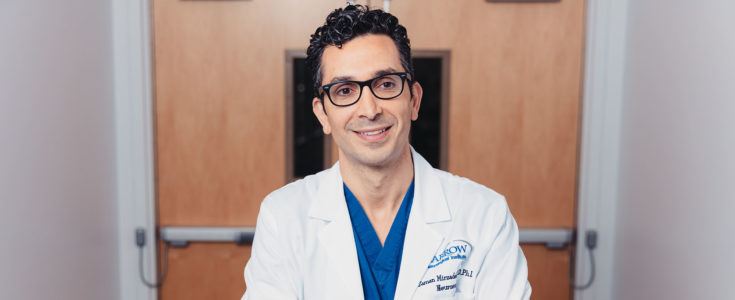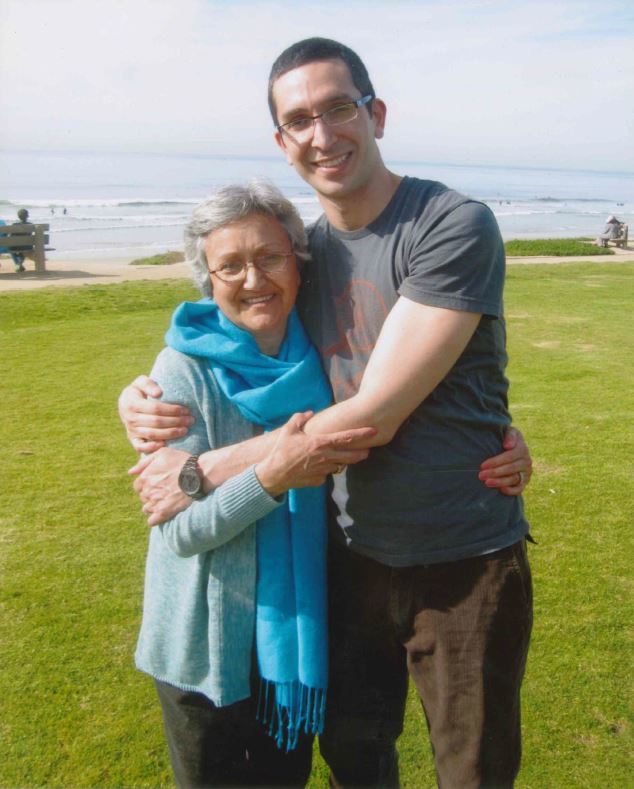
Ivy Blog
It’s Personal: Dr. Zaman Mirzadeh
- November 9, 2020
- Ivy Center
- Posted in #ItsPersonal

Lessons Learned Through a Brain Cancer Diagnosis
“The work that we’re doing at the Ivy Brain Tumor Center to fight brain cancer is personal to me because of what my mom went through, and because I see patients day in, day out, going through that same fight. And so each time, it’s a chance to find a cure. Each time it’s a chance for the work that we’re doing to move the needle for this terrible disease.”
– Dr. Zaman Mirzadeh, MD, PhD
Our #ItsPersonal campaign continues with Dr. Zaman Mirzadeh, a neurosurgeon-scientist at the Barrow Neurological Institute. Dr. Mirzadeh’s expertise lies within advanced cancer and chronic pain disorders and their neurosurgical treatment, but he also devotes a significant portion of his practice treating patients with brain tumors. “One of the most rewarding things about my job is we get to intervene at a very vulnerable point in a patient and their family’s lives,” explains Dr. Mirzadeh.
“Physicians always talk about not knowing what it feels like to be on the patient’s side. And I had heard that a lot through training, of how when you go through that experience, there’s nothing that can train you for that except actually being on the other side, and experiencing that vulnerability.”
Little did he know, his own mother who would be the one to teach him this invaluable lesson.

Dr. Mirzadeh’s mother was an accomplished electrical engineer, having studied engineering in Tehran, Iran before the revolution. One of eight women in her engineering class, she graduated with 200 students, 192 of them men. An incredibly kind, caring, compassionate and smart woman, Dr. Mirzadeh always looked up to his mother for her thoughtful teachings. They were always very close, talking multiple times a week and catching up over long phone calls.
But eight years ago, in the middle of his residency at the Barrow Neurological Institute, he received a late-night phone call from his mother on his way home from work, and it sparked a conversation he never expected to have. She explained to him she was experiencing difficulty finding words and becoming forgetful of certain words. “That’s not a vague complaint. That’s a very specific complaint, especially the way I was able to talk to her about it, and knowing how reliable of a historian she is. She can tell me exactly what she’s thinking. I was immediately very scared for what it could be and was actually hoping that it was a stroke, because a stroke [in that case] is a much less devastating diagnosis than a glioblastoma,” recalls Dr. Mirzadeh.
After that phone call, his mother went to the hospital to get a scan where doctors discovered she had a brain tumor. The family then made the quick decision to have her treated at Barrow where her surgeon performed a successful gross total resection of the tumor, which was confirmed to be a glioblastoma multiforme.
After more than a year of living a healthy and relatively normal life, Dr. Mirzadeh’s mother experienced a tumor recurrence. Having already gone through the standard of care and exhausting the few treatment options available for patients with aggressive brain tumors, she decided to enroll in a clinical trial. “My mom was very selfless. She gave everything to everybody around her and really never focused on herself. It’s kind of interesting because with the diagnosis during that year, she did change for the better. I remember talking to her a lot about, ‘Now it’s time to focus on you, you spent your whole life doing this.’ So that kind of stuff stayed with me, how much she cared for other people and how she always put other people’s needs before her own,” says Dr. Mirzadeh.
Despite being treated at the largest operative brain tumor center in the country and having a skilled team of neurosurgeons and neuro-oncologists advocating on her behalf, her tumor could not be defeated and she passed away just 14 months after her initial diagnosis. “Even though it was such a bad thing that happened to her, I take that experience with me as a very important lesson and one that cost my mother her life.”
Fast forward to 2018 when the Ivy Brain Tumor Center was established at Barrow Neurological Institute to provide a new avenue of hope to brain tumor patients with the largest Phase 0 clinical trials program in neuro-oncology. Knowing how special and unique the Center was, Dr. Mirzadeh didn’t hesitate when asked to join the team as a principal investigator where his expertise in cellular biology and stem cell biology would play an instrumental role in this first-of-its-kind initiative. Now 29 months, over 300 patients, and 10 trials later, the Ivy Center is leading the charge in the fight against brain tumors.
“I’m so proud to be a part of the Ivy Brain Tumor Center because I can say with full confidence that when brain tumor patients come here to receive treatment, the entire place, our entire team, is giving their full attention and effort to treat them.”
Dr. Mirzadeh explains that at the Ivy Brain Tumor Center each patient has an army of people supporting them from start to finish. Whether it’s patient care, surgery, clinical trials, or response to drugs. “There’s so much support behind every single patient that’s enrolled in one of the trials or undergoing treatment here. Every one of those patients is so highly valued within the Center. It’s clear. As we’re designing trials, we’re thinking about, ‘What is it like for the patient that’s going to go through the trial?’ I think all of that effort, all that commitment to each patient and their wellbeing, and finding a cure for them, I think that stands out to me. It doesn’t feel like you’re coming here and you’re just another patient enrolling in a trial.”
“The work we’re doing at the Ivy Brain Tumor Center is personal to me because I got to see what my mom went through, and in treating the patients that I treat now, I see that happening over and over again. Each new patient we enroll, or each drug that we talk about, each study that we design, it’s a chance for us to make a difference that we couldn’t previously. We’re really trying to move the needle. We’re trying to get to a cure for these patients. I don’t view our value or our success as always requiring the patient to live really a long life, but it’s making that impact in that vulnerable position to bring their family to a new normal. A lot of times that involves really helping out patients that otherwise would have a shorter lifetime, and we help extend their life, but not just in the quantity, but also in the quality.”
Dr. Mirzadeh describes that the Ivy Brain Tumor Center approaches brain cancer in a fundamentally new way. “Here at the Center, we find new and unique therapies fast for each patient, and we try as many things as possible until we can determine the right treatment. As the largest Center doing Phase 0 clinical trials, we’re able to get results much faster, and with faster patient accrual. Moreover, the trial duration is much shorter, so we are able to understand if the specific drug or therapy is working in a matter of days, not months.”
After dedicating his life work to neuroscience, Dr. Mirzadeh understands how meaningful his work is and how much value it adds to each patient and the lives of their family. The Center is seeing more and more patients come from all over the country, perhaps after they’ve exhausted most of their options. “Even within glioblastoma, there are multiple subtypes, and so it’s important to pick the right drug for the right type of glioblastoma, if you really want the patient to benefit. The advantage of being here and having so many trials going, again, the fact that the trials are shorter means we can do more of them. One of the things I see with patients is they never want to give up. Because of how many different trials we’re doing, almost every patient can find one that works for their tumor. Through these trials we will identify new cocktails of drugs that will give glioblastoma patients a longer survival time and eventually lead to a cure.”
Dr. Mirzadeh also explains that the Ivy Brain Tumor Center is special because the staff leaves their egos at the door. No one is too interested in their own career advancement, as it really comes down to treating each patient in a unique and particular way. Everybody weighs in to better understand each patient, each drug, and what each person can do to help. “When we have meetings to discuss new studies or new drugs that we might be interested in, everybody gets to weigh in. It really feels like a team effort, and everybody has their particular role that goes into it. It’s a nice environment to work in.”
We welcome you to share your story on social media using the hashtag #itspersonal and tag the Ivy Brain Tumor Center. We will share as many as we can to support this movement as we work to build awareness and help those suffering from aggressive brain tumors.
We welcome you to share your story on social media using the hashtag #ItsPersonal and tag the Ivy Brain Tumor Center. We will share as many as we can to support this movement as we continue to build awareness and help those suffering from aggressive brain tumors.
Click here to learn more about why the fight against brain cancer is personal to the team at the Ivy Center.
